

The Seemingly Causal Connection Between Insulin Resistance and Cancer – The Hammer of Health. Insulin is a hormone produced by the pancreas which, among many functions, plays a central role in blood sugar management by supporting the entry of glucose intro the cell from the blood stream.
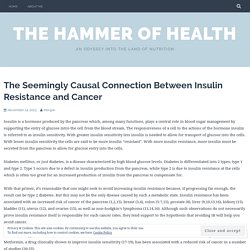
The responsiveness of a cell to the actions of the hormone insulin is referred to as insulin sensitivity. With greater insulin sensitivity less insulin is needed to allow for transport of glucose into the cells. With lesser insulin sensitivity the cells are said to be more insulin “resistant”. With more insulin resistance, more insulin must be secreted from the pancreas to allow for glucose entry into the cells. Diabetes mellitus, or just diabetes, is a disease characterized by high blood glucose levels. With that primer, it’s reasonable that one might seek to avoid increasing insulin resistance because, if progressing far enough, the result can be type 2 diabetes. Additional support for the link between insulin resistance and cancer comes from studies done on the diabetes drug Metformin. 1. 2. Metabolic Syndrome Promotes Chronic Disease. Metabolic syndrome is the most insidious promoter of chronic disease, such as heart disease and cancer, in the U.S. and much of the world today.
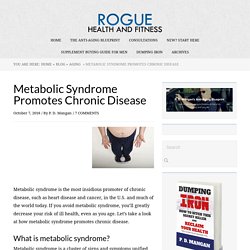
If you avoid metabolic syndrome, you’ll greatly decrease your risk of ill health, even as you age. Let’s take a look at how metabolic syndrome promotes chronic disease. Metabolic Syndrome X Causes of Insulin Resistance & Metabolic Syndrome Diet. Your eyes are getting heavy.
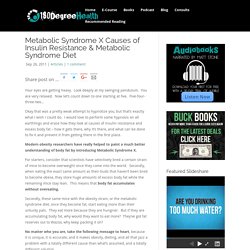
Look deeply at my swinging pendulum. You are very relaxed. Now let’s count down to one starting at five. Five-four-three-two… Okay that was a pretty weak attempt to hypnotize you, but that’s exactly what I wish I could do. Modern obesity researchers have really helped to paint a much better understanding of body fat by introducing Metabolic Syndrome X. For starters, consider that scientists have selectively bred a certain strain of mice to become overweight once they come into the world. Metabolic Syndrome Raises Endometrial Cancer Risk.
Reversing Type-2 Diabetes with Diet. Nutrition and Heart and Vascular Health. Polycystic Ovary Syndrome (PCOS) Fasting Insulin. A blood test for fasting insulin can be one of the most important that you get.
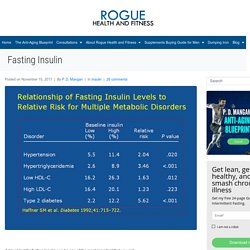
It’s important because it shows the degree of insulin resistance: the higher the number, the more insulin resistant. A very high number generally means type 2 diabetes. A number merely higher than normal can signify metabolic syndrome or pre-diabetes. Insulin Promotes Cancer. Many people, perhaps most, think that cancer is just something that strikes. That there’s little you can do about avoiding it – other than not smoking cigarettes. That is not the case, since there’s a link between insulin and cancer, and we can control insulin levels.
Associations between insulin and cancer People who are in the highest quintile (fifth) of insulin levels have a 62% higher risk of dying from cancer, and a 161% risk of dying from gastrointestinal cancer. (Perseghin, Gianluca, et al. The above chart shows survival in terms of death from cancer in people in the top quintile (fifth) of fasting insulin, vs quintiles 1-4. Low Carbohydrate Diet REVERSES Cardiac Markers in Diabetes. We are now seeing medical studies that show that diabetes and heart disease, digestive diseases and cancer are improved with a low carbohydrate diet.
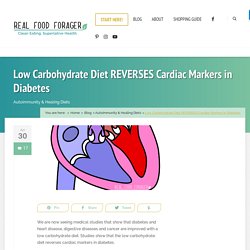
Studies show that the low carbohydrate diet reverses cardiac markers in diabetes. Many people are still opposed to the low carbohydrate diet. I just don’t know why. Low Adiponectin Links Blood Sugar Problems and Heart Disease. Phytonutrients Reduce Blood Pressure & Inflammation. Phytonutrients are nutrients found in plants that develop to protect the plant from damaging environments.
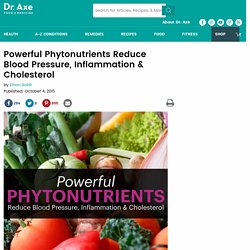
Plants are exposed to excess ultraviolet radiation, predator pests, toxins and pollution, resulting in the generation of dangerous free radicals within their cells. These free radicals can then bind and damage proteins, cell membranes and DNA of the plant. Fortunately, phytonutrients simultaneously develop to shield the plant from such damage as well as provide their color, flavor and smell. Why is this important to us? Since we are exposed to radiation and various environmental elements just like plants, we need phytonutrients to protect us. How do we get phytonutrients? The American Cancer Society defines phytonutrients or phytochemicals as: plant compounds like carotenoids, lycopene, resveratrol and phytosterols that are thought to have health-protecting qualities.
When we eat this highly cornified diet, we’re eating a highly processed diet. Dr. 5 Health Benefits of Phytonutrients. How to Diagnose, Prevent and Treat Insulin Resistance [Infographic] - Diagnosis:Diet. What You Need to Know about Sugar and Insulin Resistance In today’s post our fructose journey comes to a sweet conclusion, with answers to the questions that really matter: How much sugar is safe for you to eat?
![How to Diagnose, Prevent and Treat Insulin Resistance [Infographic] - Diagnosis:Diet](http://cdn.pearltrees.com/s/pic/th/resistance-infographic-192021310)
How much fructose and glucose is in your favorite foods, drinks, and sweeteners? How can you tell if you have insulin resistance (damaged carbohydrate metabolism)? What are some of the common clues? Earlier in this series we discovered that fructose is not scarier than glucose. So, should you focus on reducing the amount of glucose-y food you eat and lean towards fructose-y foods instead? Good luck with that…people talk about fructose as though it’s a separate sugar from glucose, but practically speaking, it’s not. Luckily, it doesn’t matter. Who wants any of those? It may seem sweet and innocent, but sugar is actually your worst nightmare. #Context - Butter, eggs, and the epidemiology of cardiovascular disease and diabetes.
When Ancel Keys started work on his hypothesis, in 1955, he reported that butter only accounted for 4.8% of fats consumed in the USA.[1] Remember that.

It’s well-known that eggs are associated with type 2 diabetes in the USA, but there’s no such association in the rest of the world, and in Finland eggs have protective association with type 2 diabetes. “When stratified by geographic area, there was a 39% higher risk of DM (95% CI: 21%, 60%) comparing highest with lowest egg consumption in US studies (I2 = 45.4%, P = 0.089) and no elevated risk of DM with egg intake in non-US studies (RR = 0.89; 95% CI: 0.79, 1.02 using the fixed-effect model, P < 0.001 comparing US with non-US studies). Whey Protein Improves Triglycerides, LDL Cholesterol, and Insulin in Overweight Adults.
Whey Protein Improves Fatty Liver and Lowers Cholesterol. Preventing Obesity-Related Fatty Liver Damage. Unclog Your Liver & Lose Abdominal Fat – Leptin Diet Weight Loss Challenge #6. Tocotrienols Improve Multiple Aspects of Metabolic Syndrome. How to "Beet" Hypertension. Magnesium Significantly Reduces Blood Pressure. Is Iron Overload Causing Your Bone Loss, Heart Disease or Diabetes?